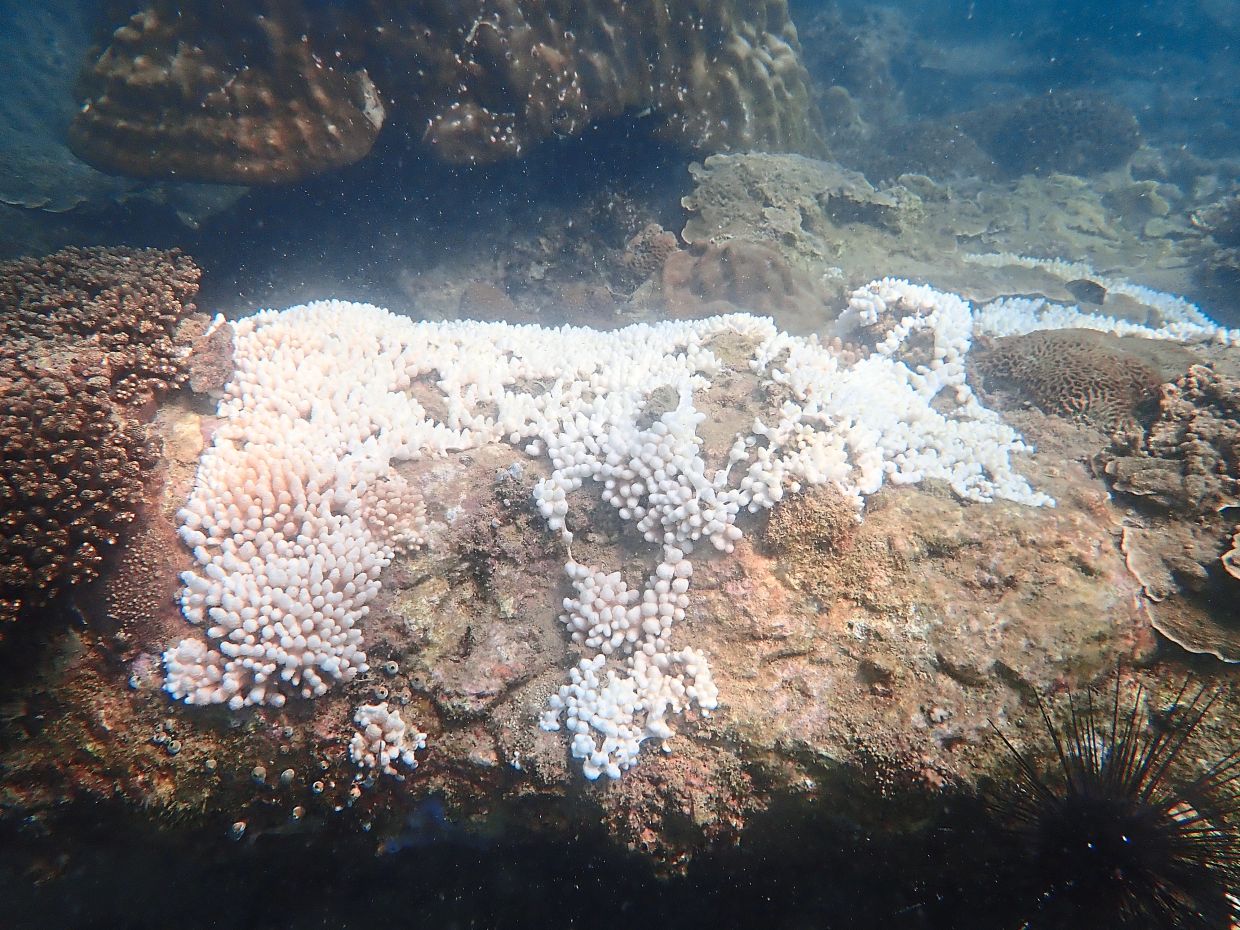Coral reefs serve as habitats for small crustaceans, breeding grounds for fishes and are the main attraction at the Mersing islands.
NGO: Heat-induced mass bleaching will impact livelihoods and tourism
THE El Nino phenomenon, which causes unusual warming of surface waters, is directly impacting coral reefs at the Mersing islands in Johor.
Surveys of reefs done last month at Pulau Aur and Pulau Pemanggil by Reef Check Malaysia (RCM) and the Johor Fisheries Department recorded water temperatures of up to 33°C, which is above the normal 28°C to 29°C range for the Mersing area, RCM manager Nazirul Amin said.
During the dive, the team also saw the bleaching of some coral colonies, possibly because of rising water temperatures.
When the water is too warm, corals will expel the algae living in their tissues, causing it to turn completely white. This is called coral bleaching.
While corals can survive a bleaching episode, they may die from the stress.
ALSO READ: Corral locals, students to help protect marine life
“This is the 15th year we have been conducting reef check surveys with the Johor Fisheries Department,” said Nazirul.
“The surveys are conducted along a transect line that is laid at a constant depth at selected reef monitoring sites.
“The data on the substrate (reef composition), invertebrate, fish numbers, and human and natural impacts are recorded in four 20m-long sections along the line.
“It provides a snapshot of reef health within the surveyed area. Some of the reefs on these islands have been surveyed since 2008, so long-term trend information and changes in reef health have been recorded.
“Based on last year’s findings, we have seen improvements in live coral cover at many of the surveyed reefs at the Mersing islands, reversing a declining trend that has been going on since 2016.
“However, we are concerned by what we have seen during our recent dives.
“If this warm water temperature phenomenon prolongs, a mass bleaching event is likely to happen, and as a result, we might lose the corals.
“The improvement in live coral cover at the Mersing islands that we have seen in previous years may be shortlived,” Nazirul said.
As a member of the national Bleaching Response Committee, RCM is working with the Fisheries Department to continuously monitor the reefs around the Mersing islands as the heatwave grips the region, he said.
“We have asked local communities, dive operators as well as NGO partners to keep an eye out for signs of bleaching whenever they are out in the reef areas.”
According to him, there isn’t much they can do if wide-scale bleaching starts to happen “because we cannot reduce the seawater temperature”.
As for an action plan, he pointed to the Coral Bleaching Response Plan published by the Fisheries Department.
The plan outlines several steps on how to react to bleaching, such as by managing local stressors to increase the resistance capacity of the reefs against warmer temperatures.
Managing local stressors by effecting site closures can restrict human activity in affected areas, thereby removing potential physical damage by divers, snorkellers, anchoring boats, fishing and other activities that can further weaken the bleached reefs.
This, Nazirul said, would allow the corals to concentrate all their energy on survival and recovery from bleaching damage.
“We hope that this concerted effort by various parties will help us respond effectively to the bleaching event and inform the public on what is happening,” he added.
RCM Mersing Sustainable Tourism programme manager Atteleth Don Peris said the coral bleaching phenomenon would affect not only marine life but also the livelihoods of local communities and tourism players.
“Many Mersing folk work as fishermen and are involved in marine-based tourism so their income depends on the coral reefs.
“We know from scientific findings that a thriving coral reef ecosystem supports a healthy fish population and its underwater environment attracts tourists.
“Mersing is known for its beautiful underwater scenery and the abundance of fish that are caught for sale.
“Without healthy reefs, the aspiration for Mersing to become a thriving hub for tourism would be greatly diminished,” said Peris.
Teluk Penyabong Resort Mersing senior manager Fahmi Abd Malik said a local conservation group should be established.
“For example, in Pahang’s Pulau Tioman, the Tioman Marine Conservation Group includes all of the tourism industry players, village chiefs, government agencies, and conservation groups under one umbrella.
“Whenever there is a problem, everyone can play a role. The government can provide the funding, the experts can work out the solution and the public can be in charge of conservation and protection.”
Tourism operators also seem to recognise the need for reef preservation.
Mak Su Chalet Pulau Tinggi owner Norashimah Sharom said coral reefs should be treated like treasures as they were the main attraction for visitors.
“People come to snorkel and dive in the Mersing waters because of its beautiful reefs, which are home to various types of marine life.
“So if the corals are dead, there will be no marine population and people will stop coming to the island.”
Norashimah, who is also a sea turtle egg collector for the Johor Fisheries Department, said her guests witnessed the release of sea turtle hatchlings and this was a major attraction at her chalet.
“This tourism business depends entirely on the well-being and health of the environment.
“The sea turtles came here due to the abundance of food and healthy marine biodiversity, without it, we would also not be here,” she added.











